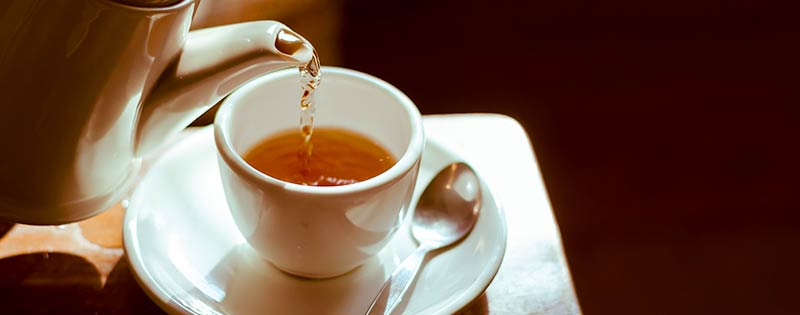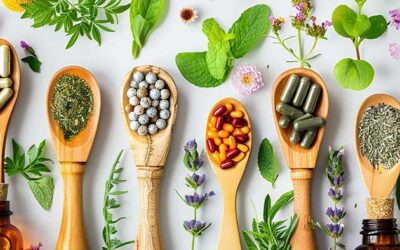by Brent Hearn •
When it comes to social beverages—well, social daytime beverages, at least—it’s pretty clear that coffee is king in the United States. Sure, tea shops are a thing, but by and large, people hold work meetings at coffee shops. They catch up with an old friend or have a first date over coffee. They post pictures of their novelty coffee cups on Instagram. (Or is that just me? Maybe that’s just me.)
No disrespect to coffee, of course; I’m a big coffee drinker. But there’s much to be said for that other hot, caffeinated beverage: tea. Though it may play second fiddle to coffee in the U.S., tea is far more popular than coffee when you zoom out to look at global beverage preferences.
The Good Stuff
Besides being flavorful in its own right, hot tea offers various health benefits. For our purposes, we’ll focus on non-herbal teas. (Did you know that non-herbal teas are all brewed from leaves from the same plant? It’s called Camellia Sinensis.)
Rich in Antioxidants
Even if you don’t know precisely what they are, you’ve probably heard of or read about antioxidants—and in all likelihood, what you’ve heard or read is probably good. Antioxidants help to neutralize free radicals in the body, which can cause cell damage when left unchecked. Tea is rich in antioxidants, which combat inflammation and oxidative stress in the body caused by free radicals.
Lower Caffeine Content
Though the amount of caffeine in tea differs based on a variety of factors, overall, it has substantially less caffeine than coffee. That’s not to say that caffeine is inherently bad; mind you, there are several considerations to weigh when deciding on caffeine intake. But if you’re looking to cut down on caffeine, substituting a cup of tea for a cup of joe is one way to do it. (Green tea has significantly less caffeine than black tea, so keep that in mind, particularly if you prefer tea in the evenings.)
May Lower the Risk of Serious Disease
“That’s great,” you may be thinking. “Rich in anti-who-whats-its and less caffeine. Now hit me with the good stuff!” Done.
Tea may help prevent or reduce your risk of a host of serious ailments, including heart disease, stroke, type 2 diabetes, obesity, depression, and neurodegenerative conditions like Alzheimer’s disease. (There are other possible benefits as well. There’s a lot of research out there; feel free to use the sources below as a starting point.)
Some Caveats
Go Easy on the Sugar
As Americans, we love to take something good for us and figure out ways to make it less healthy. (See “loading up vegetables with cheese and salt” and “battering and frying lean protein” for starters.) So that zero-calorie tea you will be so proud of yourself for drinking after reading this article? If you load it with a ton of cream and sweeteners, you’re not doing yourself any favors. We’re not saying you can’t jazz it up a little, but a little restraint goes a long way.
Beware of Heat
The thing about hot tea is that, well…it’s hot. And as with any other hot beverage, you’ll want to consume it carefully, particularly if you’re not the one who prepared it. This goes double if you’re in a moving vehicle; you don’t want an abrupt stop to result in a trip to the hospital caused by a scalding cup of tea.
Another thing to consider: Some studies have linked drinking overly hot beverages to increased esophageal cancer in people with other risk factors. Now, before you freak out and toss your tea leaves to the wind, it’s important to note that this doesn’t mean that hot tea causes cancer on its own.
One theory is that the scalding liquid can damage the lining of the esophagus, which could enable carcinogens (tobacco/alcohol/pollution/etc.) to enter. Assess your risk factors and respond accordingly. (And if your takeaway from this paragraph is that you should stop drinking tea instead of ditching cigarettes, please read it again. Perhaps over a cup of just-hot-enough tea.)
Sources:
- NBC News: Drinking tea may lower the risk of diabetes, heart disease, and death, mounting research shows
- Healthline: Is Hot Tea Good for You? Everything You Should Know
- Pew Research Center: Chart of the Week: Coffee and tea around the world
- mayoclinic.org: Caffeine content for coffee, tea, soda, and more
- Women’s Health: Black Tea Vs. Green Tea: What’s the Difference? Nutritionists Break Down The Health Benefits Of Each
- Healthline: Antioxidants Explained in Simple Terms
- Healthline: Hot Tea and Esophageal Cancer: How Hot Is Too Hot?









 ▶︎
▶︎  Why is the Discount Challenge prize amount $15,024? Because that is the average “per-occurrence” fine for Medicare inducements. That’s not $15,024 per patient, that’s not per provider, that’s PER VISIT. Stinks, doesn’t it? To us, the prize amount is worth the investment if we can help our profession better understand proper discounting.
Why is the Discount Challenge prize amount $15,024? Because that is the average “per-occurrence” fine for Medicare inducements. That’s not $15,024 per patient, that’s not per provider, that’s PER VISIT. Stinks, doesn’t it? To us, the prize amount is worth the investment if we can help our profession better understand proper discounting.